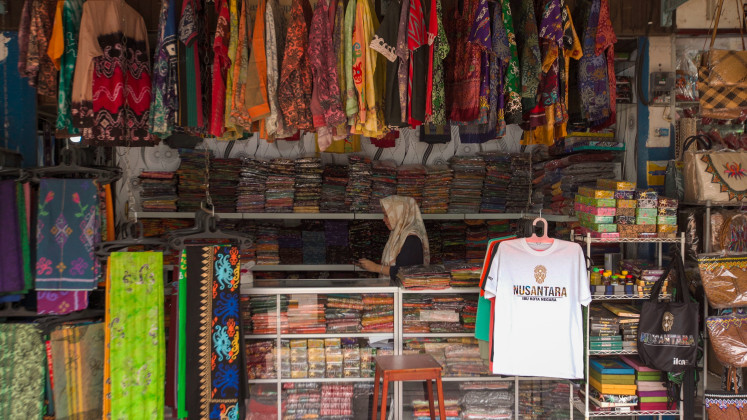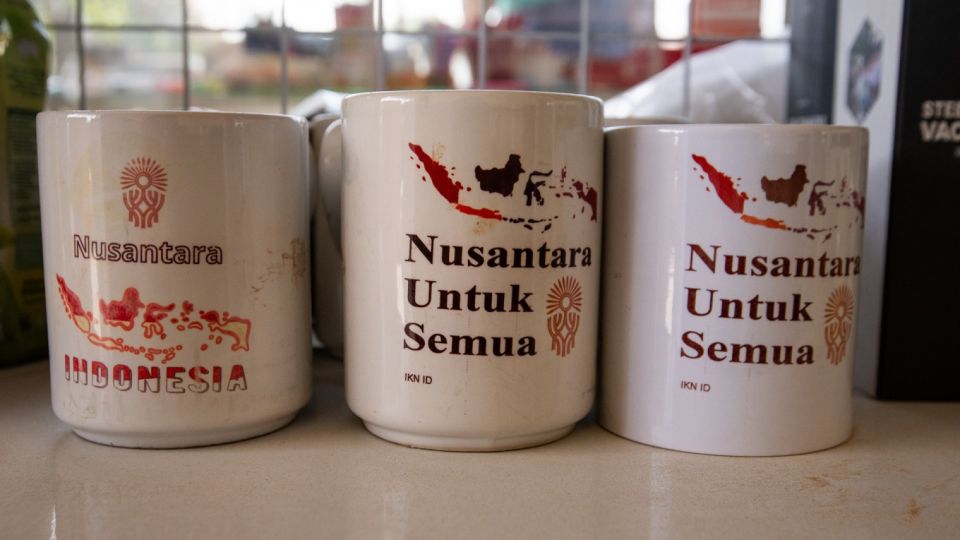August 16, 2024
NORTH PENAJAM PASER – Outgoing President Joko “Jokowi” Widodo has been racing against all odds to unveil Indonesia’s future capital Nusantara in East Kalimantan, just in time for the nation’s 79th Independence Day anniversary on Aug. 17.
This year’s celebration promises a series of festivities, with the backdrop of the new presidential palace taking the shape of the mythical bird Garuda, the nation’s symbol, with its black, steel wings.
The new city is far from complete, which has been acknowledged by the President. But the palace, the ceremonial field and some other buildings are ready to host the Independence Day commemoration, an event that has been capitalized on by residents living on the doorsteps of the future capital city.
Despite the bare-bones status of many parts of Nusantara, Jokowi has embarked on at least two publicity tours in the past month to showcase the progress of the work in and around the city, while convincing the world that the future capital is ready for Aug. 17.
The first tour, on July 28, saw Jokowi riding a motorcycle along a scenic route to the future capital city. Along the way, the President, clad in a black motorcycle jacket, opened the Balang Island Bridge, a key part of the new toll road designed to link Nusantara with its surrounding satellite cities.
He then spent two nights, including a sleepless one, at the newly finished Garuda Palace. Many view the palace, with 4,650 blades of steel emulating the mythical bird’s wings, as an architectural marvel, rising majestically from the hilly forests of East Kalimantan in just two years.
Jokowi’s second tour kicked off on Aug. 11. This time, he brought all the cabinet members with him. The President had dinner with his ministers in the evening that day, followed by a cabinet meeting—the first in Nusantara—the following day.
“The new capital Nusantara is a canvas on which we can carve out the future,” Jokowi told reporters before the Aug. 12 cabinet meeting.
Apart from the palace, most of the buildings in Nusantara’s Central Government District (KIPP) are still under construction, including a new airport designated for VIP guests. The government has blamed heavy rain for hampering work on the airport.
Just as the government launched cloud seeding flights to prevent rain clouds from interrupting work in Nusantara, Jokowi’s visits have been touted as a PR move to remove any lingering doubts about the ambitious project ahead of its unveiling on the global stage.
With only two months left in his decade-long presidency, Jokowi now stands on the brink of making history as the Indonesian leader who successfully moved the national capital from Jakarta to its new home.
“Not every country has the opportunity or ability to construct a new capital from zero.”
Business boom
With Nusantara airport still under construction, Balikpapan emerges as a crucial transit hub for the future capital
Thousands of travelers and guests for the Aug. 17 ceremony are expected to land in Sultan Aji Muhammad Sulaiman Sepinggan International Airport in Balikpapan. Airport management is setting up plans for the arrival of regular and VIP passengers, said general manager Ahmad Syaugi Shabab.
But East Kalimantan’s second-largest city has long lacked tourist attractions, making it less appealing to visitors. At least until Nusantara came along.
The future capital has brought an influx of visitors to Balikpapan, spurring the local economy and creating new business opportunities in the coastal city.
The excitement surrounding the new capital was showcased well at Kebun Sayur Market in Balikpapan, with clothes bearing the Nusantara logo becoming the hottest fad in the past six months, to the more traditional array of souvenirs, such as traditional Bornean fabrics and local handicrafts.
“Nusantara is now all the buzz, and we traders automatically [switch to] whatever is popular,” Ani, whose stall in the market was adorned with Nusantara T-Shirts, told The Jakarta Post.

Clothes vendor Ani checks her smartphone while waiting for customers at the Kebun Sayur Market in Balikpapan, East Kalimantan, on July 23, 2024. Merchandise bearing the theme of Indonesia’s planned future capital Nusantara has soared in popularity among the city’s visitors, compared with traditional Kalimantan souvenirs, since the construction of the new city started in 2022. PHOTO: THE JAKARTA POST
Nusantara-themed merchandise, which she commissioned on her own, has been flying off the shelves more than the traditional trinkets. Most of her buyers are construction workers posted in the future capital.
“They rotate every three months, so they’re sure to buy up to a dozen of these T-shirts for their families and friends back home,” Ani said.
Merchandise business is not the only one booming thanks to the future capital. More visitors are looking for cars to take them to and from Nusantara, giving local businesspeople like Samuel Andu a meteoric rise in revenue and assets from chauffeuring.
Sleepy Sepaku no more
The business boom has also made its way into Sepaku, a district in North Penajam Paser regency on Nusantara’s doorstep.
Once a quaint village, the district has rapidly transformed into a vibrant hub for newcomers who range from government officials to laborers.
These people have been flocking to restaurants across Sepaku, including one located on the main road leading to Nusantara owned by Sulis Sugiarti. When she first opened over two decades ago, Sulis would be lucky to sell 5 kilograms of rice and chicken each day.
Now, she and her workers have to cook at least 30 kg of rice daily and prepare around 50 kg of beef and fish every few days; a success that has also helped other small businesses, such as fishermen, farmers and home cooks preparing crackers that are sold in the restaurant.
“I have received many orders for lunch boxes for the Independence Day celebrations,” Sulis said. “We couldn’t accept them all, so we shared the order with other restaurants in town.”
Endah Sulistyaningsih has also been scrambling to manage excessive bookings for her home-style inn in the district ahead of the Aug. 17 celebration. She opened the inn less than a year ago using her personal savings and the compensation she received for her grandmother’s land, which was acquired for Nusantara’s water infrastructure.
“Some people who have stayed at my place even asked me to help them look for alternatives,” she said, “but there’s not much I can do since it’s all full.”
Endah is now working to open a second inn, hoping to help other Sepaku residents seize the business opportunities that come with the future capital city.
Independence day jubilation
The upcoming 79th Independence Day celebration, the last for President Jokowi before he steps down in October, is expected to be a historic one, as it commemorates the transition of Indonesia’s capital from Jakarta to Nusantara.
Jokowi will lead the ceremony in Nusantara, which will be attended by around 2,000 guests, including Defense Minister and president-elect Prabowo Subianto. Vice President Ma’ruf Amin and vice president-elect Gibran Rakabuming Raka, who is Jokowi’s eldest son, will join the ceremony remotely from Jakarta.
Officials from Jakarta and local administrations have been busy preparing for the celebrations. Yatiman Setiawan, head of Bukit Raya village in Sepaku that directly borders Nusantara, for example, was looking for accommodation for security personnel and guests coming on Aug. 17.
“We are the ‘hosts’ for the event, so security details and guests will stay in our village,” he said.
While the President’s office shared few details about the celebration with Yatiman, the village head said the locals were eager to contribute. He said that they had been offering their homes to visitors and wanted to line up along the street to wave small flags when the guests arrive.
The excitement does not stop with the residents. Businesses are also preparing to supply products to the village office, hoping to attract guests looking for local souvenirs. Endah, who manages a Bukit Raya village enterprise (BUMDes), also turned a ceremonial field into a food court, providing locals with more opportunities to set up food kiosks.
With the celebration approaching, construction workers in the new city also have ants in their pants ahead of Nusantara’s first public showcase.
Harry Herdiana, for example, is a man from West Java who spent almost a year building and installing the steel beams for the Garuda Palace in Nusantara. He admitted that he was initially pessimistic that the work could be finished in time for the August celebration, but he grew more optimistic as the wings started to take shape.
“I’m just a small part in a big project, but I’m very proud to have been involved,” Harry told the Post. “I hope that the palace can be the country’s pride too.”
The dust from the construction is settling now, with all work put on hold ahead of the Independence Day celebration. Workers are busy preparing for parties and making sure electricity, water and internet are running for Aug. 17, according to Danis Hidayat Sumadilaga of the Public Works and Housing Ministry, who leads the infrastructure construction in Nusantara.
This year’s Aug. 17 celebration feels like more than just an occasion to commemorate Independence Day; it will also open uncharted territory for the country with the future capital city.
akarta, the current capital plagued by its perennial problems of pollution and traffic congestion, will retire with the shimmering-new Nusantara set to take its place. The mastermind behind the new city, Jokowi, is also stepping down in two months, with Prabowo, his preferred successor, set to continue bearing the torch.
“I think Jokowi has played a historic role by deciding to move the capital,” the defense minister said on Aug. 12. “So I need to continue the project at the very least, or even finish it if I can.”
Both criticism and lavish praise continue to ring loud around Jokowi and Nusantara. How both will ultimately go down in the history books is still anyone’s guess.
But everyone can look forward to witnessing a once-in-a-lifetime Aug. 17 celebration.


